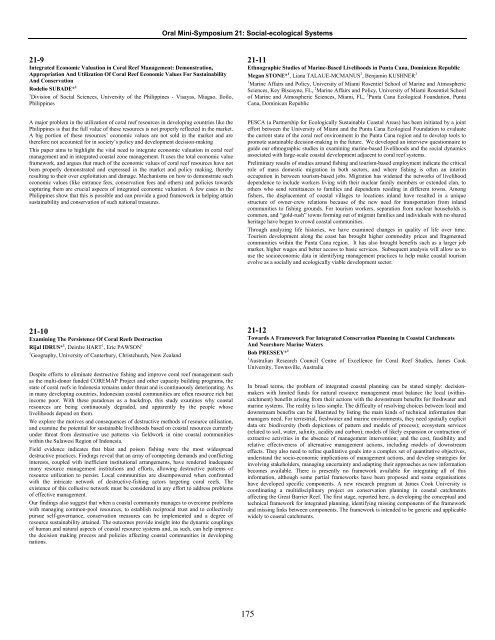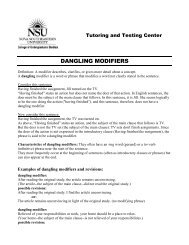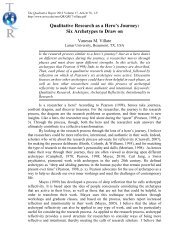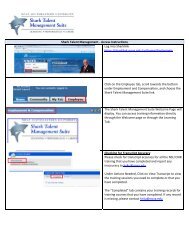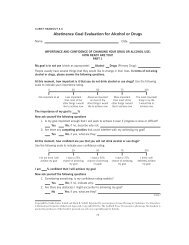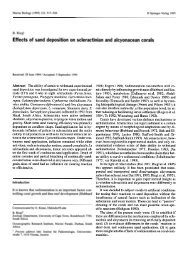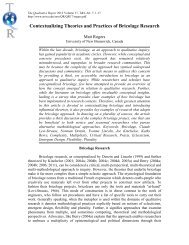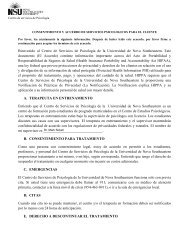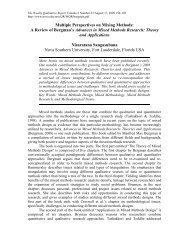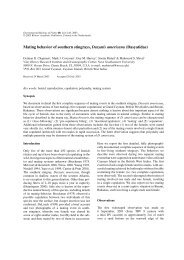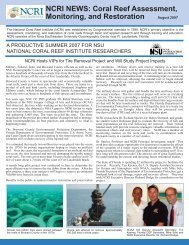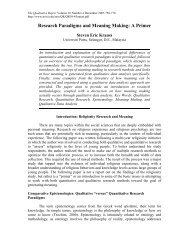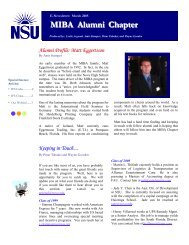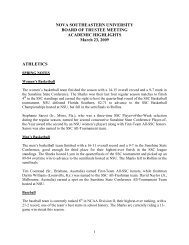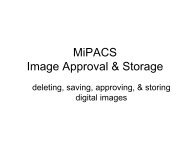11th ICRS Abstract book - Nova Southeastern University
11th ICRS Abstract book - Nova Southeastern University
11th ICRS Abstract book - Nova Southeastern University
Create successful ePaper yourself
Turn your PDF publications into a flip-book with our unique Google optimized e-Paper software.
21-9<br />
Integrated Economic Valuation in Coral Reef Management: Demonstration,<br />
Appropriation And Utilization Of Coral Reef Economic Values For Sustainability<br />
And Conservation<br />
Rodelio SUBADE* 1<br />
1 Division of Social Sciences, <strong>University</strong> of the Philippines - Visayas, Miagao, Iloilo,<br />
Philippines<br />
A major problem in the utilization of coral reef resources in developing countries like the<br />
Philippines is that the full value of these resources is not properly reflected in the market.<br />
A big portion of these resources’ economic values are not sold in the market and are<br />
therefore not accounted for in society’s policy and development decision-making<br />
This paper aims to highlight the vital need to integrate economic valuation in coral reef<br />
management and in integrated coastal zone management. It uses the total economic value<br />
framework, and argues that much of the economic values of coral reef resources have not<br />
been properly demonstrated and expressed in the market and policy making, thereby<br />
resulting to their over exploitation and damage. Mechanisms on how to demonstrate such<br />
economic values (like entrance fees, conservation fees and others) and policies towards<br />
capturing them are crucial aspects of integrated economic valuation. A few cases in the<br />
Philippines show that this is possible and can provide a good framework in helping attain<br />
sustainability and conservation of such national treasures.<br />
21-10<br />
Examining The Persistence Of Coral Reefs Destruction<br />
Rijal IDRUS* 1 , Deirdre HART 1 , Eric PAWSON 1<br />
1 Geography, <strong>University</strong> of Canterbury, Christchurch, New Zealand<br />
Despite efforts to eliminate destructive fishing and improve coral reef management such<br />
as the multi-donor funded COREMAP Project and other capacity building programs, the<br />
state of coral reefs in Indonesia remains under threat and is continuously deteriorating. As<br />
in many developing countries, Indonesian coastal communities are often resource rich but<br />
income poor. With these paradoxes as a backdrop, this study examines why coastal<br />
resources are being continuously degraded, and apparently by the people whose<br />
livelihoods depend on them.<br />
We explore the motives and consequences of destructive methods of resource utilisation,<br />
and examine the potential for sustainable livelihoods based on coastal resources currently<br />
under threat from destructive use patterns via fieldwork in nine coastal communities<br />
within the Sulawesi Region of Indonesia.<br />
Field evidence indicates that blast and poison fishing were the most widespread<br />
destructive practices. Findings reveal that an array of competing demands and conflicting<br />
interests, coupled with inefficient institutional arrangements, have rendered inadequate<br />
many resource management institutions and efforts, allowing destructive patterns of<br />
resource utilization to persist. Local communities are disempowered when confronted<br />
with the intricate network of destructive-fishing actors targeting coral reefs. The<br />
existence of this collusive network must be considered in any effort to address problems<br />
of effective management.<br />
Our findings also suggest that when a coastal community manages to overcome problems<br />
with managing common-pool resources, to establish reciprocal trust and to collectively<br />
pursue self-governance, conservation measures can be implemented and a degree of<br />
resource sustainability attained. The outcomes provide insight into the dynamic couplings<br />
of human and natural aspects of coastal resource systems and, as such, can help improve<br />
the decision making process and policies affecting coastal communities in developing<br />
nations.<br />
Oral Mini-Symposium 21: Social-ecological Systems<br />
21-11<br />
Ethnographic Studies of Marine-Based Livelihoods in Punta Cana, Dominican Republic<br />
Megan STONE* 1 , Liana TALAUE-MCMANUS 2 , Benjamin KUSHNER 3<br />
1 Marine Affairs and Policy, <strong>University</strong> of Miami Rosentiel School of Marine and Atmospheric<br />
Sciences, Key Biscayne, FL, 2 Marine Affairs and Policy, <strong>University</strong> of Miami Rosentiel School<br />
of Marine and Atmospheric Sciences, Miami, FL, 3 Punta Cana Ecological Foundation, Punta<br />
Cana, Dominican Republic<br />
PESCA (a Partnership for Ecologically Sustainable Coastal Areas) has been initiated by a joint<br />
effort between the <strong>University</strong> of Miami and the Punta Cana Ecological Foundation to evaluate<br />
the current state of the coral reef environment in the Punta Cana region and to develop tools to<br />
promote sustainable decision-making in the future. We developed an interview questionnaire to<br />
guide our ethnographic studies in examining marine-based livelihoods and the social dynamics<br />
associated with large-scale coastal development adjacent to coral reef systems.<br />
Preliminary results of studies around fishing and tourism-based employment indicate the critical<br />
role of mass domestic migration in both sectors, and where fishing is often an interim<br />
occupation in between tourism-based jobs. Migration has widened the networks of livelihood<br />
dependence to include workers living with their nuclear family members or extended clan, to<br />
others who send remittances to families and dependents residing in different towns. Among<br />
fishers, the displacement of coastal villages to locations inland have resulted in a unique<br />
structure of owner-crew relations because of the new need for transportation from inland<br />
communities to fishing grounds. For tourism workers, separation from nuclear households is<br />
common, and “gold-rush” towns forming out of migrant families and individuals with no shared<br />
heritage have begun to crowd coastal communities.<br />
Through analyzing life histories, we have examined changes in quality of life over time.<br />
Tourism development along the coast has brought higher commodity prices and fragmented<br />
communities within the Punta Cana region. It has also brought benefits such as a larger job<br />
market, higher wages and better access to basic services. Subsequent analysis will allow us to<br />
use the socioeconomic data in identifying management practices to help make coastal tourism<br />
evolve as a socially and ecologically viable development sector.<br />
21-12<br />
Towards A Framework For Integrated Conservation Planning in Coastal Catchments<br />
And Nearshore Marine Waters<br />
Bob PRESSEY* 1<br />
1 Australian Research Council Centre of Excellence for Coral Reef Studies, James Cook<br />
<strong>University</strong>, Townsville, Australia<br />
In broad terms, the problem of integrated coastal planning can be stated simply: decisionmakers<br />
with limited funds for natural resource management must balance the local (withincatchment)<br />
benefits arising from their actions with the downstream benefits for freshwater and<br />
marine systems. The reality is less simple. The difficulty of resolving choices between local and<br />
downstream benefits can be illustrated by listing the main kinds of technical information that<br />
managers need. For terrestrial, freshwater and marine environments, they need spatially explicit<br />
data on: biodiversity (both depictions of pattern and models of process); ecosystem services<br />
(related to soil, water, salinity, acidity and carbon); models of likely expansion or contraction of<br />
extractive activities in the absence of management intervention; and the cost, feasibility and<br />
relative effectiveness of alternative management actions, including models of downstream<br />
effects. They also need to refine qualitative goals into a complex set of quantitative objectives,<br />
understand the socio-economic implications of management actions, and develop strategies for<br />
involving stakeholders, managing uncertainty and adapting their approaches as new information<br />
becomes available. There is presently no framework available for integrating all of this<br />
information, although some partial frameworks have been proposed and some organisations<br />
have developed specific components. A new research program at James Cook <strong>University</strong> is<br />
coordinating a multidisciplinary project on conservation planning in coastal catchments<br />
affecting the Great Barrier Reef. The first stage, reported here, is developing the conceptual and<br />
technical framework for integrated planning, identifying missing components of the framework<br />
and missing links between components. The framework is intended to be generic and applicable<br />
widely to coastal catchments.<br />
175


